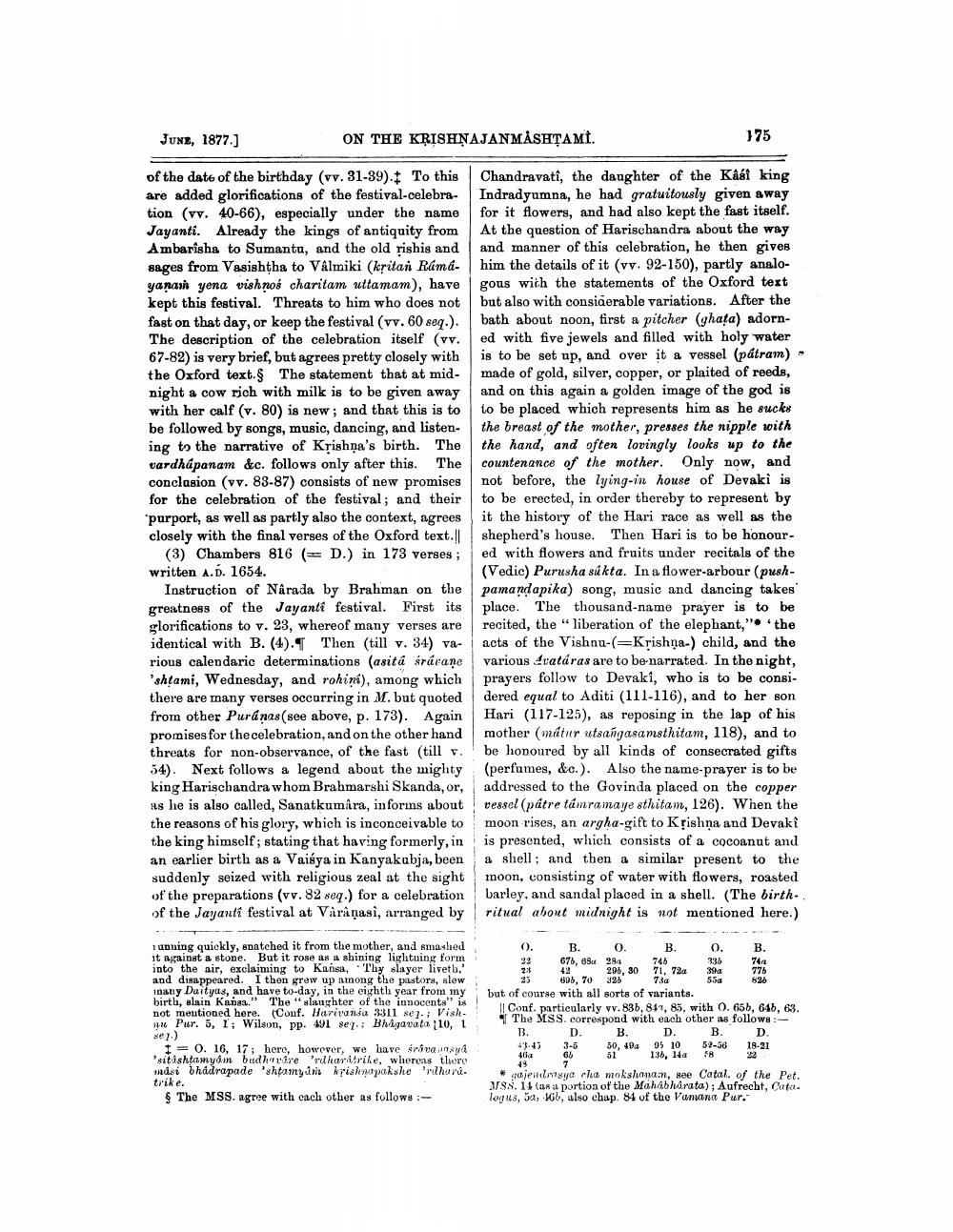________________
ON THE KRISHNAJANMASHTAMI.
JUNE, 1877.]
of the date of the birthday (vv. 31-39). To this are added glorifications of the festival-celebration (vv. 40-66), especially under the name Jayanti. Already the kings of antiquity from Ambarisha to Sumantu, and the old rishis and sages from Vasishtha to Vâlmiki (kritan Rámáyanam yena vishnos charitam uttamam), have kept this festival. Threats to him who does not fast on that day, or keep the festival (vv. 60 seq.). The description of the celebration itself (vv. 67-82) is very brief, but agrees pretty closely with the Oxford text.§ The statement that at midnight a cow rich with milk is to be given away with her calf (v. 80) is new; and that this is to be followed by songs, music, dancing, and listening to the narrative of Krishna's birth. The vardhápanam &c. follows only after this. The conclusion (vv. 83-87) consists of new promises for the celebration of the festival; and their 'purport, as well as partly also the context, agrees closely with the final verses of the Oxford text. (3) Chambers 816 ( D.) in 173 verses; written A.D. 1654.
Instruction of Nârada by Brahman on the greatness of the Jayanti festival. First its glorifications to v. 23, whereof many verses are identical with B. (4). Then (till v. 34) various calendaric determinations (asitá śrávane 'shtami, Wednesday, and rohini), among which there are many verses occurring in M. but quoted from other Puranas (see above, p. 173). Again promises for the celebration, and on the other hand threats for non-observance, of the fast (till v. 54). Next follows a legend about the mighty king Harischandra whom Brahmarshi Skanda, or, as he is also called, Sanatkumâra, informs about the reasons of his glory, which is inconceivable to the king himself; stating that having formerly, in an earlier birth as a Vaisya in Kanyakubja, been suddenly seized with religious zeal at the sight of the preparations (vv. 82 seq.) for a celebration of the Jayanti festival at Varanasi, arranged by
unning quickly, snatched it from the mother, and smashed it against a stone. But it rose as a shining lightning form into the air, exclaiming to Kansa, Thy slayer liveth," and disappeared. I then grew up among the pastors, slew nany Daityas, and have to-day, in the eighth year from my birth, slain Kanaa." The "slaughter of the innocents" is not mentioned here. (Couf. Harivansa 3311 seq.; Vishnu Pur. 5, I'; Wilson, pp. 491 seq.; Bhagavata 110, 1 se1.)
10. 16, 17; here, however, we have śrvasyå 'sitishṭamyom budhirre rdharatrike, whereas there ási bhadrapade 'shtamyam krishnapakshe 'rdharátrike.
§ The MSS. agree with cach other as follows:
Chandravati, the daughter of the Kâsî king Indradyumna, he had gratuitously given away for it flowers, and had also kept the fast itself. At the question of Harischandra about the way and manner of this celebration, he then gives him the details of it (vv. 92-150), partly analogous with the statements of the Oxford text but also with considerable variations. After the bath about noon, first a pitcher (ghata) adorned with five jewels and filled with holy water is to be set up, and over it a vessel (pátram)" made of gold, silver, copper, or plaited of reeds, and on this again a golden image of the god is to be placed which represents him as he sucks the breast of the mother, presses the nipple with the hand, and often lovingly looks up to the countenance of the mother. Only now, and not before, the lying-in house of Devaki is to be erected, in order thereby to represent by it the history of the Hari race as well as the shepherd's house. Then Hari is to be honoured with flowers and fruits under recitals of the (Vedic) Purusha sukta. In a flower-arbour (pushpamandapika) song, music and dancing takes place. The thousand-name prayer is to be recited, the "liberation of the elephant," the acts of the Vishnu-(-Krishna-) child, and the various Avataras are to be narrated. In the night, prayers follow to Devaki, who is to be considered equal to Aditi (111-116), and to her son Hari (117-125), as reposing in the lap of his mother (mátur utsangasamsthitam, 118), and to be honoured by all kinds of consecrated gifts (perfumes, &c.). Also the name-prayer is to be addressed to the Govinda placed on the copper vessel (pátre támramaye sthitam, 126). When the moon rises, an argha-gift to Krishna and Devaki is presented, which consists of a cocoanut and a shell; and then a similar present to the moon, consisting of water with flowers, roasted barley, and sandal placed in a shell. (The birthritual about midnight is not mentioned here.)
(). 22 2:3 23
175
0. 336
39a 55a
B. 0. B. 676, 68 284 746 42 295, 30. 71, 72a 695, 70 326 73a but of course with all sorts of variants.
Conf. particularly vv. 83b, 84, 85, with O. 65b, 64b, 63. The MSS. correspond with each other as follows:B. D. B. D. B. D. 43-45 3-5 50, 40a 95 10 52-56 18-21 46a 65 51 136, 14a 58 48 7
B. 74a
776 826
22
gajenimsya cha mokshanam, see Catal. of the Pet. MSS. 14 (as a portion of the Mahabharata); Aufrecht, Catalogus, 5a, 16b, also chap. 84 of the Vamana Pur."




